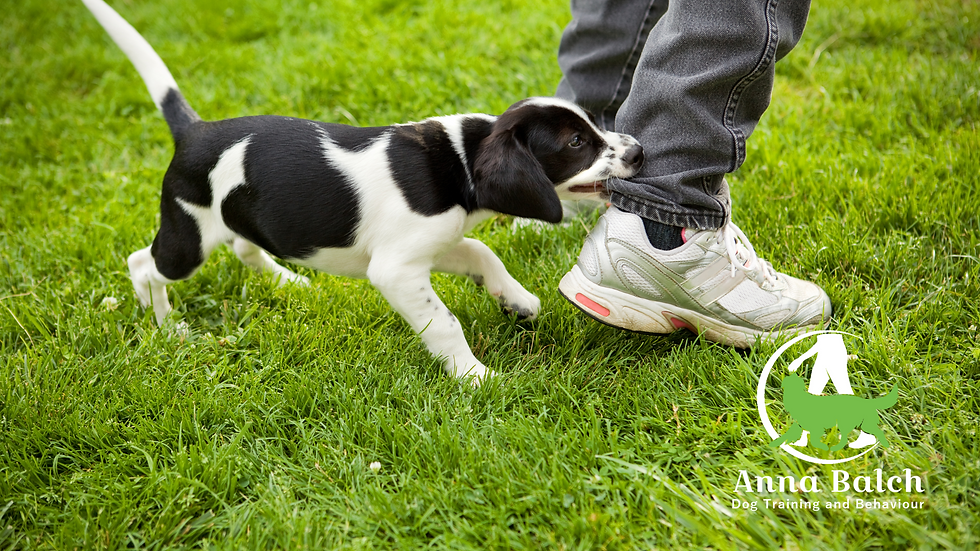How Do I Stop My Puppy Biting?
- Anna Balch

- Apr 19, 2024
- 4 min read
Updated: Jul 1, 2024

The most common problem for new puppy owners and often the most frustrating. Your small fluffy puppy is cute and sweet but their needle-like teeth are painful and persistent!
The good news is that puppy biting is totally normal and dogs typically grow out of it. There are, however, some things that we can do to help minimise the biting and preventing it from going on for longer than it needs to.
When I am talking to a puppy owners about biting and how to stop it, I often pause the conversation and talk about how to prevent it from happening in the first place! This article includes:
How to meet your puppy's needs.
How to stop puppy biting before it starts.
Meet Your Puppy's Needs
Puppies start to bite and nip for a reason. If we can identify the reason, we can look at putting management techniques in place to prevent it. Let's look at some examples:
Your puppy is over-tired
This is one of the most common reasons for puppy biting. You puppy has been awake for 2 hours and is getting sleepy. Not all puppies know how to take themselves off and settle down for a nap. They therefore become over-tired and start causing trouble!
Regular scheduled nap times can help with this. You should be able to start to recognise when they are getting tired and encourage them to rest before they go too far over that behaviour threshold.
Never use a 'time out' as a punishment. Encourage your puppy to rest in their crate or bed or to engage in a soothing activity which will help them to get some rest.
Your puppy is hungry
Nipping and biting can happen when your puppy needs something. They do not yet have other good ways to communicate. I often see puppies get nippy and bitey when they are hungry.
Ensuring your puppy has a good quality meal and is fed at times that suit them can help negate hunger pangs.
Your puppy is over-aroused
Play is an important part of a dogs well-being but puppies don't always know how to play properly or how to regulate their excitement. Remember that your puppy is only doing what comes naturally to them.
Sometimes puppies nip and bite during and after play with their humans. They can start with a toy and then switch to making contact with your clothes and skin. Puppies do not always know the different between your sleeve and a stuffed toy. Try to engage them onto the toy instead. End play sessions before your puppy starts to get over-excited by taking regular breaks.
Important! If anyone in the family play-fights with your puppy with their hands, you are likely to have a puppy who learns this is acceptable with everyone.
Your puppy is bored
Mental enrichment is so important at this stage in your puppy's life. We do not need to exercise them to tire them out, we need to satisfy their mental need to be challenged and meet their specific needs.
Make sure your puppy has plenty of different types of toys and organise 1-2 activities that promote calmness and problem solving in the day. Aim for things that encourage licking, sniffing and chewing.
Prevent The Biting From Starting
More often than not, we can predict when the biting and nipping is going to happen. Some common times include:

'Witching hour' - between 5-7pm and your puppy seems to not know what to do with themselves!
When people enter the room.
When children are running in the garden.
When your puppy comes back from a walk.
If we know when it is likely to happen, then we can put measures in place so that it doesn't!
Lets take children playing as an example. Every time the children play in the house or the garden, your puppy chases them and then starts to bite their ankles or trouser legs.
Possible solutions:
Use barriers to prevent your puppy from chasing the children. Reward your puppy for calmly watching them instead.
Give your puppy something else to do such as a Kong or Lickimat whilst the children are playing.
Give the children alternative ways to interact with your puppy, for example, simple tricks and training, find it games and gentle cuddles.
Yes, we can aim to re-direct our puppies once they are biting and nipping but it is better to put management in place to prevent it in the first place. Puppies are going to bite, its a very natural way for them to communicate, play and interact with the world around them.
Never tell a puppy off for showing this natural behaviour. Teach them how to succeed in doing something else whilst meeting their mental and physical needs.
Did you know, you can start training with your puppy before their vaccinations are complete? Its actually best to do so! Check out at what age you can start training your puppy.
If you would like more help with your training, please contact your nearest force-free positive training for personalised tips and advice.





Comments